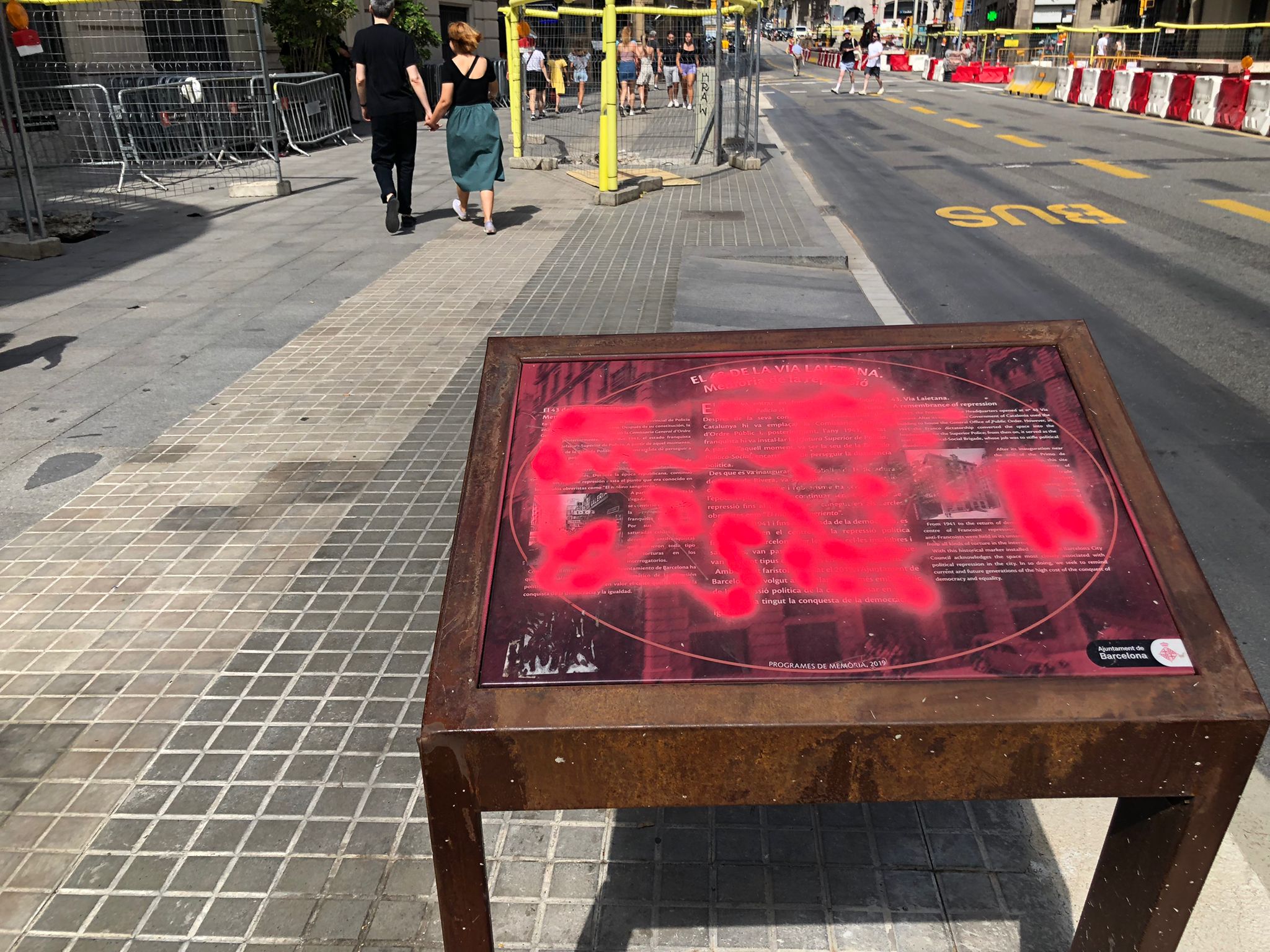Yet another attack on democratic memory. An historical memory association, the Dignity Commission, has denounced that the memorial lectern located in front of the Spanish National Police station on Barcelona's Via Laietana has once again been vandalized. This plaque explains, in Catalan, Spanish and English, the history of the police station and the fact that it was a centre of the political repression carried out for several decades of the twentieth century in Catalonia. Thousands of people were arrested and held here, and many of them were ill-treated and tortured for being political dissidents of one type or another, from 1941 until as late as the 1990s.
The damage to the memorial, however, is not an isolated and random event. On the contrary, the Dignity Commission has previously denounced repeated attacks to this historical marker. To be specific, there have been at least four attacks against the element placed by the Barcelona city council in 2019 as a first step for the transformation of the building into a centre of historical interpretation to educate people on the terrible history of political repression and torture that was centred here. The plaque was previously attacked in March 2019 - the very day it was placed - then in early April the same year, but the city council quickly repaired the damage. However, on October 12th, 2019, the lectern that marks the tortures in Via Laietana was attacked again.

Demand for an investigation
A grouping of four Catalan historical memory and victims associations have sent a request to the delegate of the Spanish government in Catalonia, Maria Eugènia Gay, to investigate this latest attack on the memorial. They ask Gay to open an investigation, since the lectern is located just a few metres from the door of the police station which is guarded round the clock by Spanish National Police office and the surroundings of the building are also monitored by video surveillance cameras with which it will be possible to obtain images of the attack and clarify the circumstances and identify those responsible.
Further demands
The collectives making the complaint propose that, should it be determined that the competence for investigating the matter does not lie with the National Police, the CCTV recordings should be placed in the hands of the Catalan police, the Mossos d'Esquadra. The groups also demand that Barcelona city council replace the Catalan senyera flag that was removed from Montjuïc Castle. A flag placed in tribute to and reminder of that placed there in 1936 by Catalan president Lluís Companys. The Dignity Commission asked for its restitution last July after it had been stolen in June. The collectives point out that an action like the vandalism against the lectern cannot be hidden, and they say they fail to understand how the council of mayor Ada Colau has not made public the incidents that occurred or carried out any investigation. In the case of the Castle, it is closed at night with military security, and during the day has a large number of visitors, making it difficult to remove a flag that measures five by eight metres.
The Via Laietana memorial and its text
Below, the image on the damaged historical lectern, followed by the full text in English from the city council's democratic memory website.

"In 1929, the Provincial Police Headquarters opened at nº 43 Via Laietana. After its creation, the Government of Catalonia used the building to house the General Office of Public Order. However, in 1941 the Franco dictatorship converted the space into the headquarters for the Superior Police; from then on, it served as the seat of the Political-Social Brigade, whose job was to stifle political dissidence. After its inauguration near the end of the Primo de Rivera dictatorship, this site became the epicentre of repression against trade unions and the workers’ movement . During the Republic, the building continued to be a place of repression, known in workers’ circles as “The bloody mill”. From 1941 to the return of democracy, this building was the centre of Francoist repression in Barcelona. Scores of anti-Francoists were held in its unsanitary, crowded cells, suffering from all kinds of torture in the interrogations. With this historical marker installed in 2019, the Barcelona City Council acknowledges the space most closely associated with political repression in the city. In so doing, we seek to remind current and future generations of the high cost of the conquest of democracy and equality."

